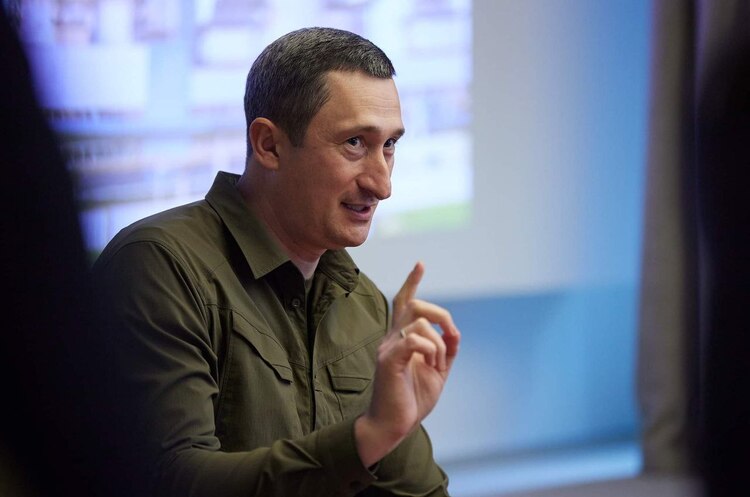To be warm: Ukraine launches heating season under any scenarios
Five accents from the speech by Oleksiy Chernyshov, Minister of Communities and Territories Development

"For the first time I am happy about global warming. The mild winter that forecasters promise is also our ally," joked Oleksiy Chernyshov, Minister of Communities and Territories Development, at a press conference on the readiness of Ukrainian cities for the heating season. Mind has collected the main theses.
On the general level of preparedness
98% is the state of preparedness of houses for the heating season, 99% – the state of preparedness of boiler houses. 18 provinces are completely prepared for the start of the heating season. As of 20 October, the readiness level of medical institutions, schools and kindergartens is slightly lower, 97%.
Centralised heating has also been restored in the liberated territories of Donetsk Oblast.
75% of the population in the liberated lands of the oblast will have heat, the gas supply being provided there.
As of today, heating has already been connected to more than 4000 social institutions (1770 kindergartens, 1602 schools, 679 medical institutions).
On the available resources
14.5 billion cubic metres of gas have already been accumulated. According to Chernyshov, the plan is to increase gas reserves to 15 billion cubic metres by 1 November.
"We are proceeding according to plan, and this will be quite enough to pass the autumn-winter period," Chernyshov said.
This figure is planned to be achieved due to local production. In case of stress factors – an extremely cold winter or loss of coal generation due to Russian missile strikes – additional volumes of about 2 billion cubic metres of gas might be needed.
Chernyshov specified that this gas is likely to be of American origin, and Ukraine expects to receive funds for it from its foreign partners.
Coal reserves currently amount to about 1.8 million tonnes, which is 0.7 million tonnes behind the established plan of 2.5 million tonnes.
"We have to produce more electricity at the expense of thermal power plants, so there is more coal consumption," the minister explained the deficit.
Also, a stock of 1.7 million tonnes of wood and 78,700 tonnes of fuel oil has been formed.
"The delivery of firewood to communities that do not have access to gas and coal has been organised. We are actively cooperating with forestries," Chernyshov stressed.
The most vulnerable sector is the power block, as these facilities are the main targets for the aggressor at this stage.
On the losses of energy infrastructure and restoration of facilities
253 of them have already been repaired, many of the remaining ones will be repaired by the end of October, and work will continue where possible.
The largest number of affected boiler houses is in Kharkiv Oblast – 188.
Three of the affected TPP/CHP plants have been fully restored, four more are at the final stage, and 12 are in emergency restoration. In Kyiv, three thermal power plants were hit.
The most frequent targets for the Russian military are transformers, substations and control rooms.
Ukraine has resources to repair the damage. The works are partially financed from the emergency fund of the state budget, and negotiations with international donors on assistance are underway.
On the stress scenarios
Scenarios have been developed for rapid response in case of damage to a heat supply facility – from connecting alternative heat sources to evacuating the population if it is impossible to restore the damaged heat generation facility in the required time.
The programme of reserve "energy points" connection is being developed. They will be installed in each settlement.
"Backup equipment should provide a supply of thermal energy, which is limited in time and capacity. We are talking about situations of complete outage. In each settlement, such energy points will be created where people will be able to warm up, drink tea, charge a gadget, get the Internet, etc. in such a stressful situation. Now this programme is being elaborated," the minister said.
Such "energy points" can operate on the basis of social infrastructure, for instance, schools, which already have backup power equipment. New points will be created at the cost of local budget reserves attracting financial and material assistance from international donors.
"We have made this request to our international partners. We are talking not only about generators, but also about mobile water supply systems and so-called 'mobile boiler rooms' that should enable the creation and comfortable operation of such points," Chernyshov said.
On conserving resources
The Minister drew his attention to the fact that so far the public and business are not responsible enough about energy saving.
"Many people have responded. But this is not enough yet. Now is the time to save not only electricity, but also gas, which European countries came close to a few months ago. This is very important, and I urge everyone to take it seriously," Chernyshov stressed.
If you have read this article to the end, we hope that means it was useful for you.
We work to ensure that our journalistic and analytical work is of high quality, and we strive to perform it as competently as possible. This also requires financial independence. Support us for only UAH 196 per month.
Become a Mind subscriber for just USD 5 per month and support the development of independent business journalism!
You can unsubscribe at any time in your LIQPAY account or by sending us an email: [email protected]


